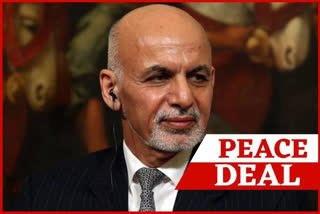Kabul: Afghanistan's president has appointed a council for national reconciliation, which will have the final say on whether the government will sign a peace deal with the Taliban after what is expected to be protracted and uncertain negotiations with the insurgents.
The negotiations were envisaged under a US-Taliban peace agreement signed in February as intra-Afghan talks to decide the war-torn country’s future. However, their start has been hampered by a series of delays that have frustrated Washington. Some had expected the negotiations to begin earlier this month.
Afghan President Ashraf Ghani issued a decree late Saturday establishing the 46-member council, led by his former rival in last year’s presidential election, Abdullah Abdullah, who is now in the government.
The council is separate from a 21-member negotiating team, which Ghani appointed in March and which is expected to travel to the Gulf Arab state of Qatar, where the Taliban maintain a political office, for intra-Afghan talks.
The council will have the final say and will ultimately decide on the points that the negotiating team takes up with the Taliban.
Abdullah's appointment to head the reconciliation efforts followed a power-sharing deal he signed in May with Ghani to end the political deadlock after last year's election a vote in which Abdullah had also declared himself a winner.
The High Council for National Reconciliation is made up of an array of Afghan political figures, including current and former officials, and nine women representatives, one of whom was named Abdullah’s deputy. Ghani also appointed former President Hamid Karzai to the council but his predecessor rejected the appointment in a statement Sunday, saying he declines to be part of any government structure.
Read more:Taliban team in Pakistan to talk Afghan peace push
Also on the council are mujahedeen and jihadi leaders who fought against the Soviet Union in the 1980s but who were also involved in an Afghanistan’s brutal civil war that followed their takeover in 1992 that left 50,000, mostly civilians, dead in Kabul. Among them is Gulbuddin Hekmatyar, who signed a peace deal with Ghani in 2016 but previously was declared a terrorist by the US.
The council also includes Abdur Rasool Sayyaf, who was the inspiration for the Philippine terrorist group Abu Sayyaf. During the 1992-1996 civil war, Sayyaf’s fighters killed thousands of minority Shiite Muslims led by a rival warlord.
However, the establishment of the council may not sit well with the Taliban, who have appointed just one 20-member negotiating team that has the authority to make final decisions. The Taliban team answers only to the insurgents' leader, Mullah Hibatullah Akhunzada.
There are also other obstacles in the way of the negotiations. The Afghan government has reversed a decision to release the last 320 Taliban prisoners it is holding until the insurgents free more captured soldiers.
